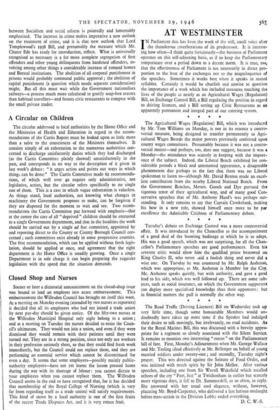AT WESTMINSTER
IN Parliament this has been the week of the still, small voice after the thunderous reverberations of its predecessor. It is interest- ing how often—I think quite fortuitously—the business of Parliament operates on this self-adjusting basis, as if to keep the Parliamentary temperature over a period down to a decent norm. It is true, too, that the effectiveness of Parliament is not necessarily in direct pro- portion to the heat of the exchanges nor to the magniloquence of the speeches. Sometimes it works best when it speaks in muted syllables. Certainly it would be churlish and unwise to question the importance of a week which has included measures touching the lives of the people as nearly as an Agricultural Wages (Regulation) Bill, an Exchange Control Bill, a Bill regulating the position in regard to driving licences, and a Bill setting up Civic Restaurants as an apparently permanent and integral part of our catering system.
* * * *
The Agricultural Wages (Regulation) Bill, which was introduced by Mr. Tom Williams on Monday, is not in its essence a contro- versial measure, being designed to transfer permanently to Agri- cultural Wages Boards the major powers previously conferred upon county wages committees. Presumably because it was not a contro- versial matter—and perhaps, too, dare one suggest, because it was a Monday—the attendance was scarcely in keeping with the import- ance of the subject. Indeed, the Liberal Bench exhibited for con- siderable periods a bleak and untenanted appearance, a disagreable phenomenon due perhaps to the fact that there was no Liberal spokesman to listen to—although Mr. David Renton made an excel- lent contribution from the nearby Liberal National Bench. From the Government Benches, Messrs. Gooch and Dye pursued the vigorous tenor of their agricultural way, and of many good Con- servative speeches that of Mr. Anthony Hurd's was perhaps out- standing. It only remains to say that Captain Crookshank, making his bow in a new role, showed himself once more to be par excellence the Admirable Crichton of Parliamentary debate.
* * * *
Tuesday's debate on Exchange Control was a more controversial affair. It was introduced by the Chancellor to the accompaniment of a good deal of the booming badinage at which he is so adept. His was a good speech, which was not surprising, for all the Chan- cellor's Parliamentary speeches are good performances. Even his severest critic would allow him the qualified praise bestowed on King Charles II, who never .,aid a foolish thing and never did a wise one. On Tuesday he was countered by Mr. Ralph Assheton, which was appropriate, as Mr. Assheton is Member for the City. Mr. Assheton speaks quietly, but with authority, and gave a good lead to his side, which was well followed up. There are some sub- jects, such as social insurance, on which the Government supporters can deploy more specialised knowledge than their opponents: but in financial matters the pull is normally the other way.
* * The Road Traffic (Driving Licences) Bill on Wednesday took up very little time, though some honourable Members would un- doubtedly have taken up more time if the Speaker had indulged their desire to talk movingly, but irrelevantly, on road accidents. As for the Royal Marines Bill, this was discussed with a brevity appro- priate for a regiment so closely associated with the Silent Service. It remains to mention two interesting " extras " on the Parliamentary bill of fare. First, Monday's Adjournment when Mr. George Wallace and Mr. Teeling tilted effectively at Mr. Bellenger on behalf of young married soldiers under twenty-one ; and secondly, Tuesday night's prayer. This was directed against the Seizure of Food Order, and was initiated with much spirit by Sir John Mellor. After various speeches, including one from Sir Wavell Wakefield which recalled echoes of the cry " Feet, feet " at Twickenham in earlier but scarcely more vigorous days, it fell to Dr. Summerskill, as so often, to reply. She answered with her usual cool elegance, without, however, placating Mr. Boyd-Carpenter, who delivered a last furious onslaught before mass-action in the Division Lobby ended everything.
D. C. W.-S.


































 Previous page
Previous page